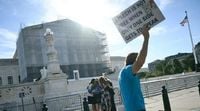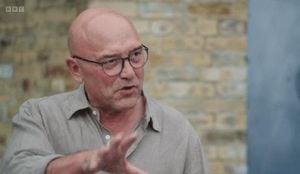The U.S. Supreme Court is once again at the center of a heated national debate, this time weighing the delicate balance between free speech, religious liberty, and the protection of minors. On October 9, 2025, the Court heard oral arguments in Chiles v. Salazar, a case challenging Colorado’s ban on so-called "conversion therapy" for minors—a law that has mirrored similar statutes in about two dozen U.S. states and most European countries, according to ZENIT News.
At the heart of the dispute is Kaley Chiles, a licensed therapist and devout Christian based in Colorado. Chiles contends that the state’s law, which prohibits counseling aimed at changing or reducing same-sex attraction or affirming a person’s biological sex, has silenced her. She insists her practice does not involve coercive conversion therapy, but rather "faith-based conversations" with minors who seek to align their feelings with their religious beliefs. As Chiles puts it, "Ms. Chiles is being silenced, and the children who seek her help are left without support," her attorney James Campbell told the Court, as reported by ZENIT News.
Colorado’s law, like others across the U.S. and Europe, was enacted in response to decades of research and advocacy by major medical organizations. The American Medical Association, the American Psychological Association, and nearly every other leading U.S. medical body have condemned conversion therapy as both ineffective and potentially traumatic for young people. The state’s attorney general, defending the law, argued that "the state has a compelling interest in shielding young people from harm, just as it regulates the use of medication or physical treatments," as stated in ZENIT News’ coverage.
The case has drawn intense interest from a wide array of stakeholders: constitutional scholars, mental health professionals, LGBTQ+ organizations, and religious liberty advocates. For some, the case is a test of whether state regulation can supersede deeply held religious convictions and parental rights. For others, it is a necessary safeguard against practices that have been widely discredited and, in many cases, linked to psychological distress.
The oral arguments, which stretched for 90 minutes, revealed a sharply divided Supreme Court. According to SCOTUSblog and ZENIT News, several justices appeared sympathetic to Chiles’ claim that the Colorado law discriminates based on viewpoint. Justice Elena Kagan questioned why the law permits only one form of counseling—affirmation—while barring another, such as helping a minor reconcile their feelings with their faith. "That looks like worldview discrimination," she observed. Justice Samuel Alito went further, suggesting that Colorado’s statute is "a blatant form of censorship."
Yet, other justices emphasized the state’s duty to protect minors. Justice Sonia Sotomayor and Justice Ketanji Brown Jackson noted that speech within therapy is not merely expression but also treatment, and thus subject to regulation. "Speech within a therapeutic context can be both expression and treatment," Justice Jackson remarked, "and the state has a duty to ensure that treatment does no harm."
The federal government, represented by Deputy Solicitor General Hashim Mooppan—appointed under the Trump administration—offered a nuanced stance. Mooppan partially sided with Chiles, arguing that "talk therapy is inherently speech" and that the government’s restriction raises serious First Amendment concerns, as reported by ZENIT News. This argument underscores the broader constitutional stakes: whether the government can regulate the words spoken within a private therapeutic relationship, especially when those words are shaped by religious conviction.
The case’s implications extend far beyond Colorado. If the Supreme Court rules in favor of Chiles, it could dismantle or weaken similar bans across the country, potentially allowing therapists to offer faith-based counseling that runs counter to prevailing medical opinion. If, on the other hand, the Court upholds Colorado’s law, it would affirm states’ rights to regulate even the conversations that occur within therapy sessions—a precedent that could reshape the boundaries of free speech in medical and counseling settings nationwide.
For many parents, especially those with strong religious beliefs, the case raises urgent questions about their ability to guide the moral and emotional development of their children. As noted in a recent piece published in World Magazine and referenced in other coverage, some individuals who have detransitioned after undergoing gender transitions have expressed regret and remorse. While such cases are rare, they highlight the diversity of experiences and the difficulty of crafting laws that respect both individual autonomy and collective well-being.
Critics of conversion therapy bans argue that these laws "turn licensed professionals into instruments of government-approved ideology," as Chiles’ attorney Campbell put it. They worry that denying therapists the right to share faith-based perspectives imposes secularism as a de facto state religion, infringing on the free exercise rights of both therapists and families. "For the law to deny a therapist, or anyone else, the right to share a message that goes back 2,000 years... would impose secularism as the state religion and deny individuals the right of choice," one commentator wrote, as cited in World Magazine.
Supporters of the bans, however, counter that the state has an obligation to protect vulnerable youth from interventions that have been condemned by the medical establishment. They point to stories, such as that of a transgender man who, according to The Washington Post, attempted suicide after undergoing conversion therapy and later described it as "bad medicine." For these advocates, allowing any form of counseling that seeks to change a minor’s sexual orientation or gender identity is not a matter of free speech but of public health and safety.
As the justices deliberate, the nation waits for a decision that could redefine the contours of both free expression and government authority in one of the most sensitive areas of American life. The ruling, expected in 2026, will not only determine the fate of Kaley Chiles and her practice, but also set a precedent that could affect therapists, parents, and young people across the country.
In the words of one observer outside the Supreme Court, "What’s on trial here isn’t just therapy—it’s the very meaning of freedom of speech when speech itself becomes the treatment." As the Court weighs these competing interests, the outcome promises to resonate far beyond the marble steps of the nation’s highest court.




